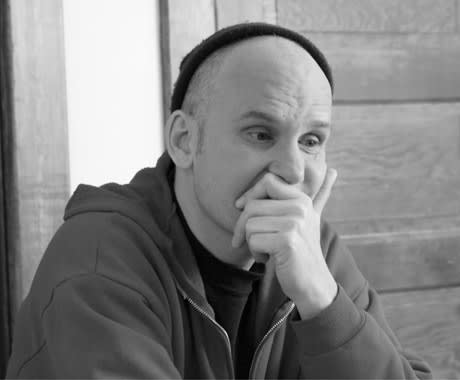When it comes to the world of music, punk rock may have the most nostalgic group of listeners. Sure, other genres suffer from their fair share of purists who pride themselves on reminding the next generation that things were better in their time, but punk as an art form has always held a certain cultural significance not only for those who lived it, but those who wished they'd experienced it.
Case in point: Riot on the Dance Floor, Steve Tozzi's new documentary about club promoter Randy Now and his Trenton, NJ punk haven, City Gardens.
Now (real name Ellis) was just your average music-loving mailman living in the Garden State, working during the day to pay his bills and hosting an increasingly popular New Wave DJ set at night. Disappointed by the lack of concerts in the area, he took it upon himself to transform the then derelict City Gardens (a bar in one of the city's more bleak neighbourhoods) into one of the scene's most happening venues.
Although not remembered as well as similar meccas like Max's Kansas City and CBGBs, City Gardens was able to carve out a particular niche in the East coast punk scene, thanks to performances from the likes of the Descendents, Fugazi, the Fall and Joan Jett, as well as more popular acts like Flock of Seagulls and R.E.M.
Riot on the Dance Floor charts City Gardens' path from industrial indie club to hardcore haunt, and subsequently traces Ellis' rise from a promoter known for upping the punks to your average fifty-something music geek.
Featuring interviews from the likes of Ian Mackaye, Jello Biafra, Dave Brockie, Mickey Ween and more, Riot on the Dance Floor delivers an inspiring oral history on one of punk rock's most important palaces, but ultimately falters due to its mixed message and lack of linear narrative.
Whether it's stories of warring skinheads or witnessing the Butthole Surfers' Gibby Haynes nearly burn City Gardens to the ground mid-concert, each of the film's talking heads helps illustrate the importance of the venue on local punks, but it's the depiction of Ellis that will leave less committed viewers wondering what all the fuss was about. In one scene, a modern day Ellis can be seen standing amongst his expansive record collection, wondering if the personal and financial cost of a life in the music business was worth it. Then, at the end of the film, the director posts a caption urging young music fans to "support their local scene" – a somewhat perplexing statement, given his interview subjects' general favouritism and fondness for the actual venue over the man who risked his personal well-being (and any hope of a retirement plan) to bring it to life.
Nevertheless, Riot on the Dance Floor is a worthwhile watch for those interested in the genre, thanks to its illuminating portrayal of one of the East coast punk scene's best-kept secrets.
Riot on the Dance Floor plays at the Bloor Hot Docs Cinema in Toronto on June 13 as part of NXNE.
(Independent)Case in point: Riot on the Dance Floor, Steve Tozzi's new documentary about club promoter Randy Now and his Trenton, NJ punk haven, City Gardens.
Now (real name Ellis) was just your average music-loving mailman living in the Garden State, working during the day to pay his bills and hosting an increasingly popular New Wave DJ set at night. Disappointed by the lack of concerts in the area, he took it upon himself to transform the then derelict City Gardens (a bar in one of the city's more bleak neighbourhoods) into one of the scene's most happening venues.
Although not remembered as well as similar meccas like Max's Kansas City and CBGBs, City Gardens was able to carve out a particular niche in the East coast punk scene, thanks to performances from the likes of the Descendents, Fugazi, the Fall and Joan Jett, as well as more popular acts like Flock of Seagulls and R.E.M.
Riot on the Dance Floor charts City Gardens' path from industrial indie club to hardcore haunt, and subsequently traces Ellis' rise from a promoter known for upping the punks to your average fifty-something music geek.
Featuring interviews from the likes of Ian Mackaye, Jello Biafra, Dave Brockie, Mickey Ween and more, Riot on the Dance Floor delivers an inspiring oral history on one of punk rock's most important palaces, but ultimately falters due to its mixed message and lack of linear narrative.
Whether it's stories of warring skinheads or witnessing the Butthole Surfers' Gibby Haynes nearly burn City Gardens to the ground mid-concert, each of the film's talking heads helps illustrate the importance of the venue on local punks, but it's the depiction of Ellis that will leave less committed viewers wondering what all the fuss was about. In one scene, a modern day Ellis can be seen standing amongst his expansive record collection, wondering if the personal and financial cost of a life in the music business was worth it. Then, at the end of the film, the director posts a caption urging young music fans to "support their local scene" – a somewhat perplexing statement, given his interview subjects' general favouritism and fondness for the actual venue over the man who risked his personal well-being (and any hope of a retirement plan) to bring it to life.
Nevertheless, Riot on the Dance Floor is a worthwhile watch for those interested in the genre, thanks to its illuminating portrayal of one of the East coast punk scene's best-kept secrets.
Riot on the Dance Floor plays at the Bloor Hot Docs Cinema in Toronto on June 13 as part of NXNE.




